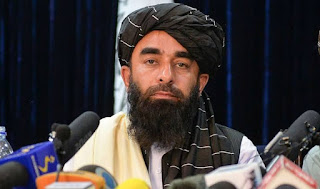Life in Afghanistan can presently be described as anyone's worst nightmare, particularly when we have to talk about issues around the wellbeing of the Afghan people.
On August 30th, the United States ended its 20 year presence in Afghanistan, in what would be described as one of the most important events in the year 2021, despite Covid-19 still holding firm to its position as the most trending and disturbing issue in the world.
Now three months after taking back control of the country since losing it back in 2001 when the US first invaded Afghanistan, the Taliban government which is currently in almost everyone's black book right now, is struggling to meet it's financial obligations with the country’s health sector seemingly the most affected.
According to a report by the BBC, the Afghan health system is currently in a serious crisis not only because workers have had to work for months without pay, but worryingly in like measure, is the conditions of hospitals which is heavily overwhelmed by patients needing medical care, in addition to lack of sufficient staff.
The report highlighted the disturbing plight of a young mother who requested that she be killed along with her baby, saying she's not certain about her own survival, much less that of her new born baby.
"I don't know how I can stay alive,so how can I give birth to another human being?" the young woman said, according to Dr Nuri (real name withheld), who is an obstetrician in central Afghanistan, and was about to deliver the baby by Caesarean section.
The women on Dr Nuri's ward are so malnourished that they know they are unlikely to have enough breast milk to feed their children.
Dr Nuri says the wards are so crowded that she has to squeeze past women in labour pressed up against blood-stained walls, or lying on dirty sheets. Most cleaners left her hospital months ago, fed up with working without pay. And the maternity ward is so crowded that sometimes there are several women to one bed. Nearby facilities and private clinics have had to close, and this once prestigious modern hospital in central Afghanistan sees three times the number of women that it used to.
"The maternity ward is one of the happiest wards of any hospital, but not anymore in Afghanistan," says the obstetrician. She says that in just two weeks in September she watched five newborn babies die of starvation. "It's like hell in here," she added.
Across the country, hospitals treating the starving are on the brink of collapse, with nearly 2,300 health facilities already closed. Doctors in remote areas have reported being unable to provide basic medicines - even something as simple as paracetamol for the gravely ill who have walked 12 hours to seek treatment.
In the capital Kabul, a major children's hospital is seeing some of the country's worst cases of starvation. It's currently running at 150% capacity.
The hospital's director Dr Siddiqi (not real name), saw a surge in fatalities in September after funding was cut, when up to four children under the age of 10 died every week from malnutrition or related diseases, such as poisoning from poor food hygiene. He says it's the youngest who bear the brunt of the crisis, with most under the age of five arriving too late to be saved.
"These children are [effectively] dying before they're admitted… We lose many cases like this," he says.
For those that do make it in time, there are few resources with which to help them - the hospital is suffering serious shortages of food and medicine, and struggles to even keep the patients warm. There is no fuel for central heating, so Dr Siddiqi now asks staff to cut and collect dried tree branches every day to feed a wood burner. "When we finish the branches we're worried about the next month and what to do next."
On Dr Nuri's maternity ward, regular power cuts are proving fatal. Several premature babies have died when their incubators failed during outages, she says.
"It is so sad to see them dying in front of your eyes."
And she says the power cuts can have potentially fatal implications for patients undergoing surgery too.
"The other day, we were in the operating theatre and the electricity was cut off. Everything stopped. I ran and shouted for help. Someone had fuel in their car and gave it to us so we could run the generator."
So, she says, every time the hospital performs an operation, "I ask people to hurry. It is a lot of stress."
Despite being forced to work under such challenging circumstances, most healthcare staff are not even paid at the moment.

